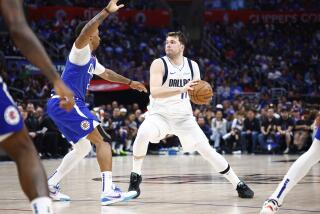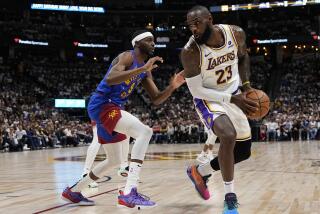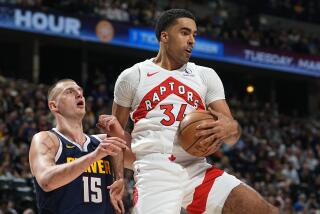There’s No Key to Open NBA’s Lockout
- Share via
Are you ready for some basketball?
Tough.
Better try ESPN Classic or put on your old Chicago Bull videos because it doesn’t look as if we’ll have any of the NBA variety until December or 1999 or the Al Gore presidency.
The NBA, alone among U.S. major leagues, has never lost a game to a labor dispute, but Numero Uno is in the bullpen, warming up. With players and owners locked in litigation that may run to Oct. 18--two weeks after camps were to open--there seems little chance of starting the season on time Nov. 3.
The drumroll already has started. The NBA has postponed its rookie orientation, the referees’ training camp and an exhibition in Israel.
Next? A source says the league just alerted teams that next week it will announce the postponement of training camps.
Ten weeks into the lockout, there has been one negotiating session, which Commissioner David Stern’s posse stomped out of, giving the parties one more reason to blast each other.
They are agreed on one thing: Things are grim.
“It’s highly unlikely we’ll start training camp on time,” Deputy Commissioner Russ Granik said from New York. “We’re not negotiating. There are no negotiations going on.
“We’d like to be negotiating but we’re not. It’s hard to be anything but pessimistic.”
The league announced refunds to season-ticket holders for games lost. (Message to union: “We’re ready to rumble.”)
In turn, Billy Hunter, director of the National Basketball Players Assn., predicted they would miss two months of the season, or more. (Reply to message: “Bring it on, chump. Let’s see what you got.”)
At this time, that is all that is known about what used to be the NBA.
Barring a resolution, we don’t know what kinds of contracts teams can offer the 190 free agents--among them Michael Jordan, Scottie Pippen, Dennis Rodman, Rick Fox, Ike Austin, Tom Gugliotta, Vlade Divac, Jayson Williams, Rod Strickland, Charles Barkley, Brent Barry, Corliss Williamson and Michael Stewart--whose futures are in limbo.
We don’t (officially) know if the Bulls are over, or who the heir apparent is, or if the Lakers can keep Fox, or if the Jazz can get Austin, or when they’ll play, or if, or anything else. This isn’t a league, for the moment, it’s a missing person.
You know that Jerry West-silhouette NBA logo? They should put it on milk cartons.
This Time, It’s Really Personal
Ironically, although the parties are far apart on the central issue of “cost certainty” or a “hard cap,” each has something important the other wants and would trade it.
Although Stern wouldn’t put it this way, he would gladly multiply the minimum salary for veterans, $272,500, addressing the union’s concern over its vanished middle class.
Likewise, Hunter would gladly lengthen the term of the rookie scale, three years, relieving teams of the necessity of committing $126-million contracts to 21-year-olds such as Kevin Garnett.
Given any good will, they should be deep in horse trading, but there is none. Some principals--notably Stern and union counsel Jeffrey Kessler--are said to loathe each other.
The problem grows out of the league’s runaway prosperity, the ensuing loss of community and the ’95 struggle, when the players repudiated their leader, Si Gourdine, a former NBA deputy commissioner, rejected the deal he’d made with Stern and tried to decertify their union.
Stern was angry that his deal was turned down. The players were angry, contending Stern ran them over.
The players then turned their union over to the insurgents who led the unsuccessful decertification drive--notably agent David Falk and Kessler--setting up certain warfare.
One of Falk’s clients, Patrick Ewing, is now union president. Several Falk firebrands, such as Dikembe Mutombo, are on the board of directors, and Falk’s crown jewel, Jordan, issues ringing manifestoes from whichever celebrity golf tournament he’s playing in, as ex officio advisor.
Kessler, a former union counsel, lost his gig when the old leadership hired another law firm, but is back in the battle. Stern, a former trial lawyer, has always played hardball. Kessler, another strong-willed barrister, likes hardball.
The summer was lost to litigation as both sides went to court, seeking to gain higher ground. They barely got to the posturing, much less the negotiating.
In the single post-lockout negotiating session, Stern walked out, claiming Kessler had insulted them by sneering the union would win its arbitration case and 220 players on guaranteed contracts would have to be paid.
Union people say Kessler didn’t mention the arbitration case until the management guys got up to leave.
You never want to underestimate the potential for grown-ups in confrontations to act like squabbling children. And these kids are supposed to work out a deal?
“I have great admiration for David Stern,” a labor source says. “But Kessler is just like Stern.
“He’s as smart or smarter than Stern but he doesn’t have Stern’s class or style. He has kind of a bull-in-a-china-shop personality and he just tees Stern off. It’s a personality conflict.”
Hunter, stepping into the trenches of this undeclared war, has handled his predicament gracefully, as in the Latrell Sprewell case, which he kept from becoming a racial issue. However, even some labor hawks wonder why Hunter lets Kessler stay out front, when Kessler so clearly antagonizes Stern.
Hunter didn’t return calls, but one answer could be: Why not? Neither side is interested in bargaining until the arbitrator, John Feerick, decides which of them has the leverage.
Spree’s Benefactor: He’s B-a-a-a-c-k
Feerick, a Fordham professor, is the man who trimmed Stern’s one-year suspension of Sprewell and put him back on the Warriors’ roster July 1.
It wasn’t outrageous, since Stern’s penalty for attacking Coach P.J. Carlesimo was wildly out of precedent. Alvin Robertson once choked Detroit General Manager Billy McKinney with no sanction. Feerick upheld the rest of the sentence, but Stern was enraged anew. (So, of course, was Sprewell, who has twice filed suits, challenging the decision.)
The league, noting that Feerick’s term expired July 1, asked a federal district judge in New York to have him removed but was turned down.
For the record, the league insists it was only trying to avoid arbitration and has nothing personal against Feerick.
This case centers on one issue--can the league shut down, according to labor precedents, or must teams pay players their guarantees in any event?
The union cites Olden Polynice’s contract, which stated he wouldn’t be paid during a lockout, arguing that demonstrates teams could bargain for relief but, if they didn’t, aren’t entitled to it.
If Feerick rules for the NBA, the union will have to bargain under the gun. Owners will lose games while players lose pay but none of management’s money from the fat new NBC contract is at risk until the first telecast--Christmas Day.
If Feerick rules for the union, and if the NBA’s certain appeal is turned down, the owners will lose much of their leverage and will have to surrender.
Adding to everyone’s anxiety level, the decision on which everything hinges may not be coming soon.
Both sides were hoping for Oct. 1, but when hearings ended last week, Feerick said he might take the entire 30 days at his discretion. The clock doesn’t even start until final briefs are filed Friday.
Thirty more days would be Oct. 18, which would be smack-dab in the middle of the exhibition season.
It promises to be quiet in the NBA this fall, at least as far as basketball goes.
More to Read
Go beyond the scoreboard
Get the latest on L.A.'s teams in the daily Sports Report newsletter.
You may occasionally receive promotional content from the Los Angeles Times.









